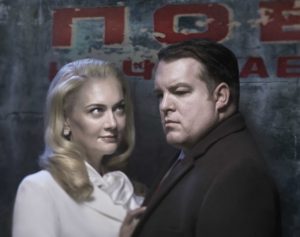
Dmitrij is an opera that keeps growing before your very ears. And growing. And growing, until you have some of the most dramatically apt music Dvorak ever wrote for the stage. But about the time the plot strands need to be tied up – as they are in a matter of minutes of Verdi’s Otello – Dvorak hits a stride that won’t stop: The final act is around 90 minutes long.
Walking into the opera on Friday at Bard College’s SummerScape in Annandale on-Hudson, I knew there would be some forgiving to do and warned my friends that the first act is pedestrian. It sets the scene, but little more. As it turned out, there was much else to forgive, such as the physical aspects of the updated but dressed-down production. But the start of Act II shows the composer of the Slavonic Dances operating at full strength, and in a way that’s less lingering than the composer’s later, more-popular Rusalka (that, at times. loves its fairy tale setting too well).
In contrast, Dmitrij – heard here in the 1885 version, years before the 1901 Rusalka – ain’t pretty. It picks up where Musorgsky’s Boris Godunov ends, with the apparent heir to the Russian throne marching into Moscow – all grown up despite reports that Boris had this son of Ivan the Terrible killed as a child. Though neither Boris nor Ivan are seen, they cast their shadows over the opera because Ivan’s supposed son Dmitri and Boris’ daughter Xenia fall in love, even though Dmitri already has a problematic Polish princess Marina, who refuses to give up her ethnic identity even though she’s becoming the mother of all Russia.
It’s no spoiler to say that Dmitri is a pretender, an everyday guy who was brought up in a monastery with a supposed resemblance to the dead czar. But, in the fashion of Rudyard Kipling’s The Man Who Would Be King, you’re never sure how much he believes his own myth. And in addition to his romantic triangle, Ivan widow Marfa claims the false Dmitri as her son even though she knows better – in a politically expedient move that ultimately backfires. Meanwhile, Marina, successfully plots to have Xenia killed. Cliched operatic stuff? The fact that it never feels that way is a sign of how good the opera is (in spots). The Macbeth-like dynamics are back, but in a different way. While Boris Godunov had a Macbeth-like route to the throne and descent into madness, Dmitri’s Marina embodies Lady Macbeth’s ruthless ambition.
The music is characteristic, fundamentally lyrical Dvorak, though with a particular feature I haven’t heard elsewhere in his output is the double choruses representing Marina’s Polish loyalists and Dmitri’s Russian supporters. They’re elaborate and dramatically quite compelling. A decade later during his American residency, the composer wrote yet another version of the opera that’s said to lack the choruses. But though it would have to be the work of a more evolved dramatist, Dvorak went back to the uneven 1885 version, and that’s now the most viable way to do the piece, since it exists in a critical edition, as opposed to the later version, which remains scattered through European archives.
Main characters have at least one major soliloquy, and that’s what makes Dmitrij a major opera. This is to Dvorak what the black-on-black Mazeppa is to Tchaikovsky. And though these soliloquies don’t have the lyricism that made the “Song of the Moon” from Rusalka one of classical music’s greatest hits, their more concentrated Dmitrij counterparts have greater dramatic specificity. Also, there must be a solid sense of tonal planning here because no matter how weary your ears might feel in the final act, the music simply won’t let you go. Thank you, Leon Botstein (who conducted the opera and is co-artistic director of the festival).
As always with veteran director Anne Bogart, the individual performers had as much dramatic awareness you could hope for. But cosmetic matters didn’t feel right at all. And as with most matters these days, it’s possible to blame Donald Trump. Like Dmitri, Trump has arrived as a powerful ruler without a political lineage, positioning himself as an everyman who initially fires the interest of the public with ideas that the more cultivated establishment wouldn’t think of.
However, by making Dmitri an Average Joe in modern dress with nothing to distinguish him from his followers, the production lacks the charismatic center that it so badly needed to put across the opera. The set looked like some moldering Russian community center. Watching it over the opera long run time required you to be a very forgiving soul.
The singing was good to excellent. Tenor Clay Hilley, who has been covering and singing heroic Wagner and Verdi roles, came through this long, emotionally taxing role with something close to triumph. As Marina, Melissa Citro gave cause for concern in her somewhat squally opening scene, but later pulled her voice together in a dramatically compelling package that wouldn’t have felt right with a cleaner more Mozartean voice. And that’s exactly the kind of voice that Olga Tolkmit had, which was thoroughly appropriate to the role of Xenia. Thanks to the opera’s female librettist Marie Cervinkova-Riegrova, there’s a third richly-drawn female character in the opera – Marfa – extremely well sung and acted by Nora Sourouzian.
Was there too much to forgive? No. This production barely got its arms around the opera. So I’d love see how another production team would stand on its shoulders.


[…] Bard SummerScape’s latest operatic resurrection: Dvorák’s long, bloody Dmitrij Dmitrij is an opera that keeps growing before your very ears. And growing. And growing, until you have some of the most dramatically apt music Dvorák ever wrote for the stage. … read more AJBlog: Condemned to Music Published 2017-08-01 […]